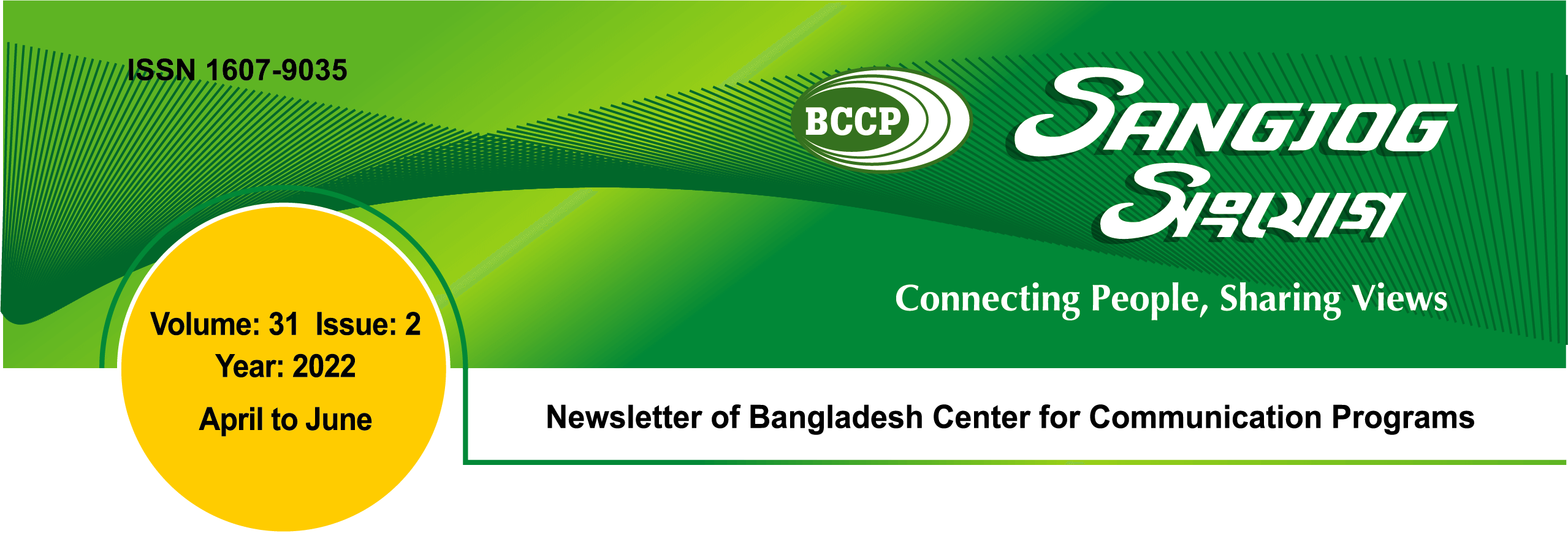
KNOWLEDGE GROWS
Main Article
Climate Change in Bangladesh: Impact on Infectious Diseases and Mental Health
Dr. Md. Shahidul Alam, Deputy Director (Training), BCCP
Being a low-lying river delta with a long coastline and floodplains that occupy 80 percent of the country, Bangladesh’s extreme vulnerability to the adverse effects of climate change is well documented. But, climate change in Bangladesh is not just about cyclones and floods. Changing and erratic weather pattern have also affected our physical and mental health. The climate change in Bangladesh have started to impact health with an increase in respiratory diseases, mosquito-borne diseases like dengue, along with deteriorating mental health conditions. 
Bangladesh has experienced an average rise in temperature of 0.5°C between 1976 and 2019. The increase in maximum temperatures during this period has been shown to be consistent on a month-to-month basis, with the months from February to November getting warmer. The rise in maximum temperature across the country has not been uniform. For instance, between 1976 and 2019, compared to a 0.5°C rise in central parts covering Dhaka and neighboring districts, maximum temperatures rose by 0.9°C in the eastern parts (Chattogram and Sylhet divisions). In general, summers are becoming longer, and winters are getting warmer and monsoon becoming unpredictable beyond the norm.
"The threats of climate change in Bangladesh have already extended to health in the form of higher incidences of respiratory diseases, vector borne diseases like dengue, along with deteriorating mental health conditions."
Monsoons are longer and rainfall is erratic
Being situated on the edge of the tropical region, Bangladesh experiences some of the wettest monsoons in the world. During peak monsoon, from June to August, the average monthly mean rainfall has declined by 60 millimeters. On the other hand, mean monthly rainfall for September and October has increased by 43 millimeters, which indicates that the monsoon period is gradually becoming longer, extending now from March to October. Rising temperature during the winter months coupled with erratic rainfall patterns have eroded the distinct seasonality in Bangladesh.
Impact on Physical Health
A survey of 15,000 people in 3600 households has shed more light on the influence of climate variability on physical and mental health.
• Respiratory illnesses are likely to increase with rising temperature and humidity. A 1°C increase in temperature rises the likelihood of contracting a respiratory infection by 5.7 percentage points, whereas a 1 percent increase in humidity rises the chances of catching a respiratory infection by 1.5 percentage points.
• Waterborne diseases like cholera are likely to decrease with rising humidity and temperature. A 1 percent increase in relative humidity reduces the probability on contracting waterborne illnesses by 1.6 percentage points, whereas a 1°C increase in mean temperature reduces the likelihood of respiratory infections by 4.2 percentage points.
• Dengue is likely to increase for Dhaka as the climatic conditions become more suitable. Humidity in the range of 60 to 80 percent, maximum temperature between 25°C and 35°C, and rainfall between 200-800 mm create ideal conditions for mosquitoes. Weather data between 1976 and 2019 indicate Dhaka is experiencing falling humidity levels, rising temperatures, and heavier summer rainfall. These together with factors like urbanization are increasing the risk of the spread of dengue in Dhaka city.
Impact on Mental Health
• Changes in weather can cause mood swings. But, seasonality has a slightly different impact on anxiety than depression.
• The level of anxiety disorders increases with temperature and humidity. Increase in mean humidity and mean temperature increases the probability of having anxiety by 0.3 percent and 0.8 percent, respectively.
• More people suffer from depression during winter. Increase in temperature lowers the probability of depression by 1.6 percent.
• Further, women are at higher risk than men for depression, while men are more susceptible to anxiety.
What can Bangladesh do to tackle these challenges?
By 2050, Bangladesh is expected to experience an increase in temperature of about 1.5°C. And between 2040 and 2059, annual rainfall is also expected to increase by 74 millimeters. These projected changes will escalate spread of infectious diseases and mental health issues. By taking urgent actions, Bangladesh can remain better prepared to mitigate the impacts of climate change on health.
The report suggests three ways for better adaptation:
• Improved data collection systems will help the country better track the evolution of climate-sensitive diseases and predict potential disease outbreaks.
• Strengthen health systems to mitigate outbreaks of infectious and other emerging or reemerging climate-sensitive diseases
• Strengthen response to mental health issues through awareness building, improving assessment mechanisms and facilitating means to address shortcomings such as self-help groups.
The effects of and responses to the health impacts of climate change will affect individuals, communities, and societies. Effectively preparing for and responding to current and projected climate change requires ongoing assessment and action, not a one-time assessment of risks and interventions. To promote resilience to climate change and other community stressors, a stepwise course of action is proposed for community-based adaptation that engages stakeholders in a proactive problem-solving process to enhance social capital across local and national levels. In addition to grassroots actions undertaken at the community level, reducing vulnerability to current and projected climate change will require top-down interventions implemented by public health organizations and agencies.
Local Government initiatives on climate change (LoGIC)
LoGIC, a multi-donor collaborative initiative of GoB, UNDP, UNCDF, EU and SIDA, aims to enhance the capacity of vulnerable communities, Local Government Institutions (LGI) and civil society organizations (CSO) for planning and financing climate change adaptation solutions in selected climate vulnerable areas. The Local Government Division (LGD) is the implementing lead of the project in partnership with UNDP and UNCDF. Under these following activities has been carried out.
• Community resilience fund operationalized to finance climate vulnerable community
• Capacity enhancement plan is developed and implemented
• Performance based climate resilient grants system is developed and implemented
• CCA-DRR financing at local level is enhanced by the active community participation
• Learning lessons at the local level and inform policy dialogue at the national level
• Climate Change Capacity Development of LGIs, households’ other local stakeholders.
• Established financing mechanism for implementing climate change adaptation measures
• Experience and evidence inform and contribute to further improvements in policies.
The World Health Organization implements a broad range of advocacy and partnership activities on climate change and health in order to: advocate and raise awareness; strengthen international partnerships and governance; enhance scientific evidence; and support health systems to respond to and prepare for a rapidly changing climate.
 WHO raises awareness on climate risks to health through advocacy campaigns, publications and policy briefs, and the representation of WHO and health actors in climate fora.
Through partnerships, networks and collaborations WHO helps to drive the global action needed to protect health from climate risks, and realize the health benefits of low-carbon energy choices.
WHO works with leading experts and institutions worldwide to improve the understanding and evidence base of the linkages of health and climate, the burden of disease attributable to climate change, and the economic and health gains from ambitious climate change adaptation and mitigation actions.
WHO raises awareness on climate risks to health through advocacy campaigns, publications and policy briefs, and the representation of WHO and health actors in climate fora.
Through partnerships, networks and collaborations WHO helps to drive the global action needed to protect health from climate risks, and realize the health benefits of low-carbon energy choices.
WHO works with leading experts and institutions worldwide to improve the understanding and evidence base of the linkages of health and climate, the burden of disease attributable to climate change, and the economic and health gains from ambitious climate change adaptation and mitigation actions.
Addressing climate change as a national priority, Bangladesh is recognized internationally for its cutting-edge achievements in addressing climate change. Bangladesh has invested more than $10 billion in climate change actions – enhancing the capacity of communities to increase their resilience, increasing the capacity of government agencies to respond to emergencies, strengthening river embankments and coastal polders (low-lying tracts of lands vulnerable to flooding), building emergency cyclone shelters and resilient homes, adapting rural households’ farming systems, reducing saline water intrusion, especially in areas dependent upon agriculture, and implementing early warning and emergency management systems.
“Fighting climate change: We need to join hands to ensure sustainability ”.
An exclusive interview on the climate change made by Dr. Md. Faruk Hossain, Associate Professor, Department of Geography and Environment, University of Dhaka
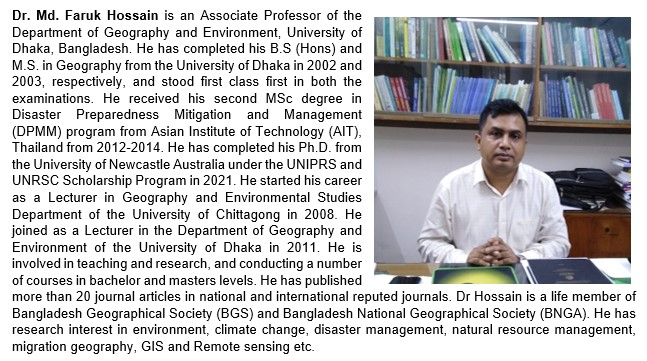 Q. How do you evaluate current situation of climate change in Bangladesh?
Q. How do you evaluate current situation of climate change in Bangladesh?
A: Bangladesh is facing an unprecedented challenges due to adverse impacts of climate change. Still the coastal parts of the country are highly vulnerable for overall natural hazards. In the last few years, we can observe the adverse effects of climate change is taking place in Bangladesh and a number of major climate change induced events are affecting our lives and livelihoods. These disasters or calamities causes a lot of damages to our lives and properties. We are not contributing much for these impacts globally but we are one of the most vulnerable countries in the world now. So, in that context, I can say that we are highly vulnerable and already we can see its effects in various level of our country.
Q. Which sectors are mostly affected by the climatic factors? As there are many sectors like health sectors, agricultural sector which of them you think are mostly affected?
A: Actually, climate change has huge impacts on several sectors and those are facing difficulties due to climate change impacts. First of all, impacts on our environment like water level submersion, water logging, saline water intrusion etc. are visible especially in the coastal parts of the country. Secondly, the water sector which is highly vulnerable. As we highly depend on the upstream water and we are getting water from our neighbor country, like India and Myanmar. Our Ganges-Brahmaputra-Meghna (GMB) River systems are also affected by the climate change related effects. In the summer season, we are facing severe water shortage problem such as water level is declining especially in the urban areas, if this situation continues in the coming days, we are going to face huge impacts due to water shortage in our country.
Q. What do you think about the health sectors? Because recently we can see in the Sylhet region or in the Sunamganj regions, there has been up starting in the Diarrhea cases because of this recent flooding. Similar cases were seen in the last years in Barguna or Barisal; Because of this salinity there was many cases of diarrhea.
A: We are facing an unusual temperature variations nowadays because of the change of weather patterns in our country. Due to these temperature variations, people are suffering from various types of health problems like; diarrhoea, dysentery, cholera, typhoid, malaria, dengue etc. which are uprising in their trend by affecting people. Moreover, changes precipitation pattern in South Asia especially in Bangladesh is taking place due to temperature change and this has adverse effects on human health. More intense and frequent heat waves are developing and these are affecting the vulnerable proportion of population like elderly people, children, and the poor.
Q. How do you describe the perception of policymakers about climate change? Do you think they are well aware of this situation and well prepared for it? Or are they not thinking about it at all?
A: Policy makers try to fulfill the vision and mission of the political government, and in many cases they could not assess the actual field scenario. From my point of view and from my research experience I would like to say that assessment of the current scenario, understanding of people’s expectations and prioritization of issues related to climate change are the most key considerations for the policy makers.
Q. Do you think there is a need for policy change regarding climate change in our country?
A: Bangladesh worked well in policy document development in climate change sector because we already received different types of policy documents on climate change issues. But the policy makers need to prioritize issues more and field level implementation is important. Policy makers with the support of other stakeholders such as NGOs, civil societies and social activists, and bring out a collaborative and all-out effort to mitigate the worse effects of climate change.
Q. Who are working on climate change sectors among the NGOs or Government sectors? Who are the prominent on this field? How are they coordinating with each other?
A: In climates change sector, government is playing the key role while NGOs, CBOs, donors, community activists are working from their own point of views to implement various programs. As the government departments are more capable and can play prime role in climate change related issues, so they need to make coordination and collaboration initiatives and mechanisms to maximize the outcomes from different programs.
Q. Is there any coordination between Government agencies and non-Governmental agencies currently exists?
A: Of course, when government takes a project, they consider the participation of different relevant stakeholders like NGOs, Civil society representatives, community people etc. They try to maintain their participation and they put their best effort to maintain the coordination also. Although in few projects, we can observe lack of coordination which resulted with failing of attaining expected results.
Q. What should be done to increase the coordination between government and non-government organization?
A: It depends on governmental departments and people those who are highly involved in climate change related projects. We know about the Ministry of Environment, Forestry and Climate Change (MoEFCC); this ministry and departments under it like; department of environment, climate change cell who are directly involved with climate change related issues, Project Directors (PDs) and other officials need to maintain and ensure coordination properly. We also have observed that good coordination are being maintained properly in many projects.
Q. You were talking about there are many policies about climate change. Would you give us some examples of any national level policy or guiding documents that are assessing the vulnerability of climate change and adaption plan?
A: Bangladesh government has developed a number of policy documents over the time on climate change issues. If I say, from the ‘90s, government is focusing on these issues. At first, it was linked with the environmental issues. Later, in 2009, government first developed Bangladesh Climate Change Strategy and Action Plan, which is called BCCSAP. Bangladesh is one of the pioneer countries among the LDCs, who has developed such kind of document. BCCSAP is still under process of revision. Before developing BCCSAP, we should also mention about the National Adaptation Plan of Action (NAPA) that was developed in 2005. Besides, Government has developed its Seventh Five Year Plan (2016-2020) where Government has mentioned the climate changing issue. Recently, in Bangladesh Delta Plan, BDP 2100; government also focused the climate changing issues. Delta Plan is actually a water-based plan where government also address the climate changing issue.
Q. What are the measures taken by the Bangladesh government for the adaptation to Climate change (policies or action plans)?
A: First of all, I can say that Bangladesh Government has changed the name of the ministry. Climate Change was not included in the name of the ministry. Realizing the significance and necessity of working on this issue, incorporating the term climate change, government has changed the name of the ministry as Ministry of Environment, Forestry and Climate Change (MoEFCC). We can say that Government has pointed out the issue seriously. Government has developed lots of policy developments. Bangladesh Government has developed their own fund, prior to which they established Bangladesh Climate Change Trust (BCCT) Act, 2010. It was Bangladesh Government’s own fund to deal with the climate change issue. Climate Changes issues are also focused and mainstreamed in several ministries of government. Till 2019, Government has incorporated 20 ministries actively work with this climate changing issues, which hopefully by 2022, will increase to 30 ministries. Government is working on different other aspects as well. Incorporating the LDC countries, a forum was formed named Climate Change Forum where our Prime Minister is the leader at this moment; Bangladesh Government is playing a vital role by negotiating in the international levels to protect our country from the adverse effects of climate change. So, we can see, Bangladesh Government is working well on climate change related issue both in national and international levels.
Q. How do you evaluate the capacity and skills of concern departments and its professionals and workers in terms of climate sensitive budgeting, pursuing climate financing to health sector?
A: Climate change finance is an important aspect of successful implementation, mitigation and adaptation plans and programs in various sectors. The UNFCCC, also focused on climate change finance issues in the world health summit in Germany in 2017. Bangladesh Government is also focusing on climate change financing related issue. We can see that, Bangladesh Government is now undertaking various projects and allocating funds specially focusing on climate changing issue.
Q. Is there enough work going on for climate changing finance for health sector?
A: Various projects are going on which are financed by the ministry of health, especially in the coastal part of our country. They are working in different aspects in the community level. First of all, they are making people aware, especially during disaster time. Government is investing money to stop the spread of contagious and other diseases so that people can get relief from various diseases. Especially Government is working on climate changing issue by investing money but these are enough or not, that is a different issue. I would say that the allocated funds are not enough compared to our affected population. Various projects are going on arsenic mitigation, and from these projects deep tube wells are given to the affected communities and these are serving safe water for the people.
Q. Bangladesh is the least contributor to the climate change situation. But, at the same time, we are building coal-based power plant and are not investing on renewable energies. Is not it conflicting?
A: About these issues, I would say that many countries have stopped producing electricity by consuming coal but we are financing in these types of projects. I have mentioned it before, because of political commitment and needs of the people, as the government tries to serve them. Policy makers finds it as the fastest way to generate electricity and to deliver the people. However, I agree that it is conflicting as many countries are transforming to the renewable sectors where we are doing a little, and we should also produce renewable energy more. On the contrary, production costs of renewable energy are more. Government is struggling for serving electricity at low cost. That is why, government is focusing on coal-based power plant.
Q. What types of capacity building is required for people working on climate change impacts like; health professionals, front line health managers, implementation level decision makers and policy makers?
A: People who are involved in climate change related issues like climate change budgeting, climate financing for health and other sectors; their capacity building initiative in our country is not remains at an expected level. Our government is doing a lot by making funds, but these things are for the field level people and community people who are the main victims. But no or very little being done for the capacity building sector. Because of the lack of capacity/skills of the professionals, government initiatives are not implemented properly. It lessens the effectiveness of various initiatives. However, NGOs are working, along with many professionals are doing good, many donors are working through NGOs by donating money where capacity building remains one of the major initiatives.
The capacity and skill development activities requires appropriate budgeting, especially the climate sensitive budget. If program fails to put enough budget for capacity and skill development, the implementation is going to be poor. Health is also vulnerable as the community people, who are affected by climate change issues, will not get proper support and a huge number of people will be at risk. So, the policy makers should be very careful and capable of planning the work properly. If the policy makers prepare and plan the document properly, we will be able see the reflection in the field level. If the field level professionals have lack of knowledge, projects cannot be implemented properly, and the attainment form those program are not in an expected level. In many cases, we have seen that, the assigned people cannot use the money properly and return back it to the government. Before, planning any projects, they should plan capacity and skill building interventions as the priority basis, and various stakeholders who are involved, their tasks are understood and implemented properly.
Q. Summing up all, do you think that, there is not enough coordination or enough supervision? That is why the field level implementation is not going up to the mark?
A: Yes, in the field level, people are not much aware also. In many projects, government departments and NGOs try to incorporate community or local people, but their interest could not have drawn to work for. Because people’s perception is that, the government and NGOs who are working and they are doing their duty only, and people will not receive any expected benefits from this. However, we can see the opposite scenario from many other projects where people are very helpful. Due to the lack of community people’s support, no one can implement any social development projects and it is very important to involve the community people and make them aware of the situation to ensure their involvement. In every stage of the climate change projects, concerned persons should inform and involve the community people to generate their interest and attain supports.
BCCP News
An Overarching SBCC Strategy Developed for Accelerating Actions to End Child Marriage (AAECM) in Bangladesh
The program for `Accelerating Actions to End Child Marriage (AAECM)’ in Bangladesh is designed to empower adolescent girls by providing them with knowledge and skills sets on SRHR, gender, communication, negotiation, self-reflection all of which are being delivered through structured life skills education program and engaging with key influential community members. 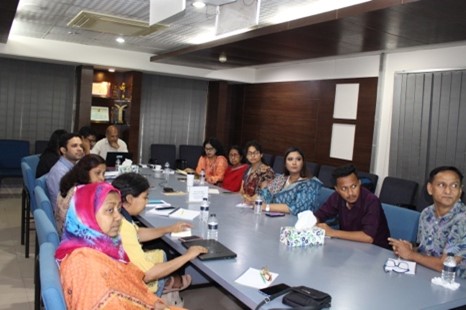 A well-structured and comprehensive SBCC strategy was a felt need to develop appropriate messages, leverage resources, engage community and reaching to the different segments of the target audiences.
A well-structured and comprehensive SBCC strategy was a felt need to develop appropriate messages, leverage resources, engage community and reaching to the different segments of the target audiences.
Following that felt need BCCP was entrusted to develop an SBCC strategy for the CWFD under an UNFPA funded project which has been developed through a systematic process of identifying communication barriers and needs related to the prevention of child marriage and planning a comprehensive mix of SBCC strategic approaches at individual, community, social and policy/legislation levels through appropriate messages and communication channels. The activity plan following this strategy is supported by a Monitoring and Evaluation plan with indicators to monitor progress and assess SBCC outcomes.
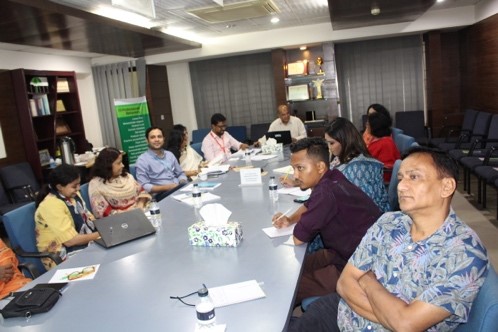 This SBCC strategy have been finally validated in a meeting on June 09, 2022 attended by DWA, UNFPA, CARE, Save the Children, World Vision, CWFD officials with few other individual consultants. The validation meeting found the SBCC Strategy as a well designed SBCC planning document. This meeting, however, made few recommendations to further tuning up the strategy in to a well-accepted program document. Key recommendations were as below:
This SBCC strategy have been finally validated in a meeting on June 09, 2022 attended by DWA, UNFPA, CARE, Save the Children, World Vision, CWFD officials with few other individual consultants. The validation meeting found the SBCC Strategy as a well designed SBCC planning document. This meeting, however, made few recommendations to further tuning up the strategy in to a well-accepted program document. Key recommendations were as below:
• Include teachers and senior management to conduct school sessions by involving teachers as facilitator
• Include channels and specific tools for school sessions; GEMS method/curriculum should be followed
• Integrate sessions on preventing the child marriage with the one with School Health, Population, Nutrition Education program recently been developed and integrated in the DGHS and DGFP’s health education programs
• Strengthen ASHC, CMPC, NNPC committees at all levels including the union level
• PNC mother giving birth a girl child is to provide message for not getting her daughter married before the age of 18
• Local government representatives to get involved in the community level interventions to prevent child marriage
• Involvement of community level youth/sports clubs for boys have been suggested to include in the action plan.
Field level rolling out of School Health, Population and Nutrition Education package got underway
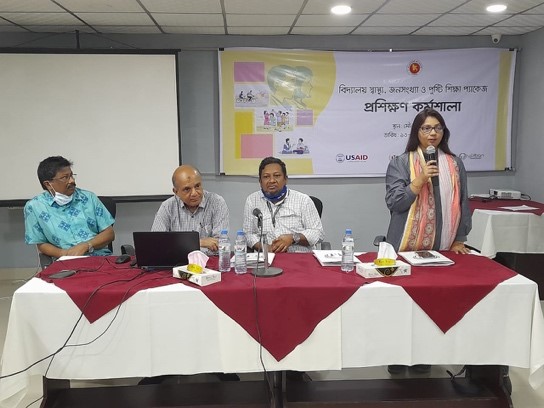 The field level implementation of the School Health, Population and Nutrition Education (SHPNE) package have begun with the training of the Sub-Assistant Community Medical Officer (SACMO) under the field programs of Director General Family Planning. USAID-Ujjiban SBCC project has been providing the technical assistance to the Ministry of Health and Family Welfare (MoHFW) and its units throughout the process of development and validation of this package followed by the ToT of the master trainers.
The field level implementation of the School Health, Population and Nutrition Education (SHPNE) package have begun with the training of the Sub-Assistant Community Medical Officer (SACMO) under the field programs of Director General Family Planning. USAID-Ujjiban SBCC project has been providing the technical assistance to the Ministry of Health and Family Welfare (MoHFW) and its units throughout the process of development and validation of this package followed by the ToT of the master trainers.
As a unified, integrated and uniform package; the SHPNE has replaced all the prior School Health, Population and Nutrition Education curriculums as were prevailed in the GoB units and NGOs of the health, population and nutrition program. In addition, the field level implementation of this package will be made combinedly by the front-level supervisors of the DGHS and DGFP. An MoHFW circular for this integrated planning and implementation have been sent to the entire directorate and local levels officials.
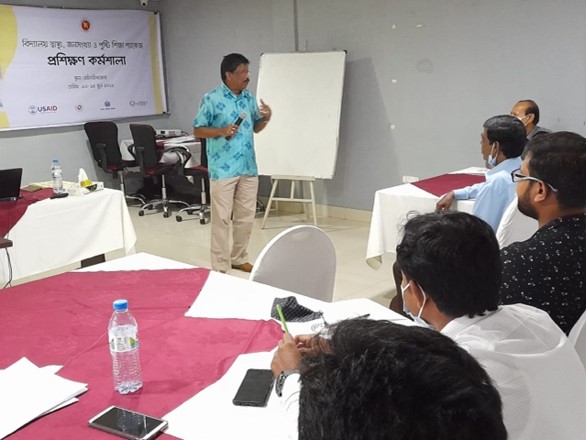 In continuation of its technical assistance, the USAID-Ujjiban SBCC project is supporting the DGFP for two field level training programs for the SACMO’s. The first of this 2-day training have been commenced with the Moulvibazar district while the later one will be held for the Cox’s Bazar district.
In continuation of its technical assistance, the USAID-Ujjiban SBCC project is supporting the DGFP for two field level training programs for the SACMO’s. The first of this 2-day training have been commenced with the Moulvibazar district while the later one will be held for the Cox’s Bazar district.
The SACMO training for Moulvibazar district has begun today on June 13, 2022 in a local venue which have been participated by 24 attendees of whom 21 were SACMO and rest 3 were from the local NGOs. This training program have been formally inaugurated by the Deputy Director-Family Planning Mr. Md. Abdur Razzaque who was attending the event as Chief Guest. As HQ representative this inaugural session was also attended by Ms. Ishrat Jabeen as Special Guest.
A wide level of interest and enthusiasm were prevailed during the sessions of first day of the training program. The participants opined that this training will further enhance their skill to deliver uniform messages on integrated version of HPN issues and better-quality facilitation to conduct for the school level orientation. It is envisaged that sustained level of household knowledge on health, population and nutrition issues will be possible with the field level implementation of the SHPNE package.
A national level Socio-Behavioral survey on the HPN fields planned with multi-stakeholder participation is on development process
Following the decision of the HPN SBCC Implementation and Monitoring committee of the MoHFW, the national level Socio-Behavioral survey on the HPN fields have been planned to conduct under the ministry’s leadership with the technical lead from NIPORT. In order to make this initiative formalized the MoHFW have formed a committee led by the Deputy Secretary, PH-2 of Health Service Division as Chairperson and Director, Research of NIPORT as Member-Secretary while development partners of the HPN fields will be the members of this committee and USAID-Ujjiban SBCC project will provide technical assistance to this initiative.
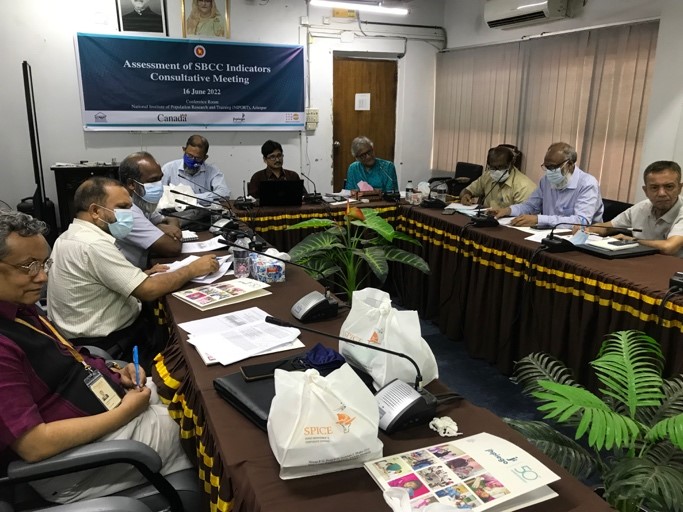 With multi-stakeholder participation the possibility on conduction of this survey will have been improvised to add value with technical expertise and resource mobilization. In course of carrying on this initiative a meeting of this committee has been held on June 16, 2022 in the NIPORT conference room under the auspices of UNFPA. This meeting was chaired by the Dr. Ahsanul Alam, Director-Research, NIPORT while Prof. Dr. AKM Nurunnabi was present as technical expert.
With multi-stakeholder participation the possibility on conduction of this survey will have been improvised to add value with technical expertise and resource mobilization. In course of carrying on this initiative a meeting of this committee has been held on June 16, 2022 in the NIPORT conference room under the auspices of UNFPA. This meeting was chaired by the Dr. Ahsanul Alam, Director-Research, NIPORT while Prof. Dr. AKM Nurunnabi was present as technical expert.
Multi-stakeholder participation in this meeting were from the GoB, DP and NGOs includes; Director-MIS, DGFP, NIPORT officials of different capacities, representatives of UNFPA, Unicef, Jhpiego, Pathfinder International, BCCP and Ujjiban.
The key decisions of this meeting were as below:
- Jhpiego will provide the secretarial support for this committee
- SBCC indicators will be requested to propose from the UNFPA, Unicef, BCCP, ICDDR-B, Ujjiban and IEM/MIS.
- A day-long workshop be held with the committee members and experts on finalizing the SBCC indicators and survey process with methodology.
Necessity of Leadership and Coordination in the HPN arena appreciated by the division and district level GoB officials of Chottogram and Sylhet
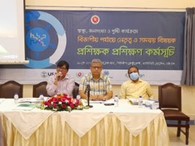 A widespread enthusiasm and expectations were prevalent in the divisional level ToT on the Leadership and Coordination that held at Chittagong on May 16, 2022 and at Sylhet on May 18, 2022. This day-long ToT have been developed with the cascaded model of training aiming at enhancing the skill and knowledge of the GoB officials working the Health, Population and Nutrition fields. Following with the ToT that held for the ministry and directorate level officials, further level of ToT has been planned for the division and district level officials to bring it down for training of the Upazila level officials. USAID-Ujjiban SBCC project has provided technical assistance for the development of the curriculum on Leadership and Coordination and continue for conducting few batches of ToT.
A widespread enthusiasm and expectations were prevalent in the divisional level ToT on the Leadership and Coordination that held at Chittagong on May 16, 2022 and at Sylhet on May 18, 2022. This day-long ToT have been developed with the cascaded model of training aiming at enhancing the skill and knowledge of the GoB officials working the Health, Population and Nutrition fields. Following with the ToT that held for the ministry and directorate level officials, further level of ToT has been planned for the division and district level officials to bring it down for training of the Upazila level officials. USAID-Ujjiban SBCC project has provided technical assistance for the development of the curriculum on Leadership and Coordination and continue for conducting few batches of ToT.
ToT for Chottogram division:
This ToT was held on May 16, 2022 in local hotel participated by the Civil Surgeon, Deputy Director-FP, Deputy Director-Health, Assistant Director-Admn., Assistant Director-QAT, and Assistant Director-FP of the 11 districts of Chottogram division. This ToT also includes participation of few Chottogram based NGOs working in the HPN fields as they may need to and plan for providing this training to their program officials. A total of 39 of the GoB and NGO officials have attended this day-long ToT.
Inaugural session
The inaugural session of the ToT was attended by the Additional Secretary, Health Service Division of the MoHFW, Mr. Syed Mojibul Huq as Chief Guest while it was also attended by the Director-Health of Chottogram division Dr. Hasan Shahriar Kabir, Divisional Director-FP of Chottogram division, Mr. Md. Habibur Rahman and the Deputy Secretary, PH-2 of the MoHFW, Mr. Md. Jashimuddin Khan as the Special Guest.
In his speech the Chief Guest has emphasized on the preventive health service approaches for the attainment of sustainable health. He also underscored the need of promoting the nutritional issues to enhance household knowledge that will profusely be contributed to the sustainable health. The Director-Health of Chottogram division mentioned this course as a useful intervention enhancing the knowledge and skill of the HPN officials on Leadership and Coordination issues. In his speech the Divisional Director-FP of Chottogram division mentioned the reciprocal connectivity of the Leadership with the Change Management that will ensure better management and implementation of Health and Family Planning program interventions.
Course Methodology
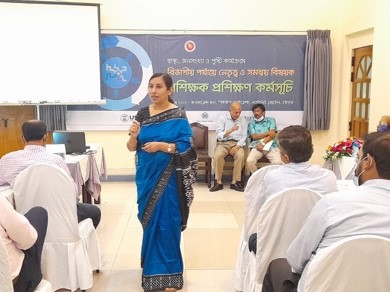 In the curriculum as well as the ToT followed the Reflection, Discussion and Synthesis (RDS) as the overall methods while particular methodology followed throughout the formal sessions includes:
In the curriculum as well as the ToT followed the Reflection, Discussion and Synthesis (RDS) as the overall methods while particular methodology followed throughout the formal sessions includes:
- Open and plenary discussions
- Question-answer
- Multi-media presentation
- Card writing
- Group work.
Observation
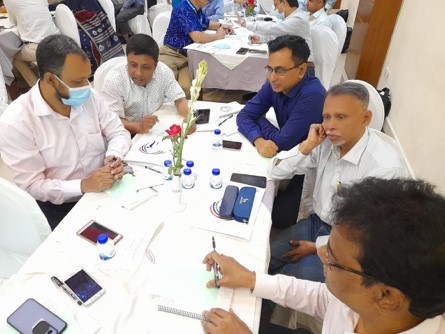 A unique level of participation was observed throughput the ToT program that made this course highly participatory and helped the participants in strengthening their interest to bring this course for their co-colleagues and Upazila level officials. During the course, participants share their own experiences and exchange views, get involved with interactive discussions and enjoy presentations supported by session exercises and reflections.
A unique level of participation was observed throughput the ToT program that made this course highly participatory and helped the participants in strengthening their interest to bring this course for their co-colleagues and Upazila level officials. During the course, participants share their own experiences and exchange views, get involved with interactive discussions and enjoy presentations supported by session exercises and reflections.
ToT for Sylhet division:
This ToT was held on May 18, 2022 in local hotel participated by the Civil Surgeon, Deputy Director-FP, Assistant Director-Health, Assistant Director-FP, UHFPO and UFPO of the 4 districts of Sylhet division. This ToT also includes participation of few Sylhet based NGOs working in the HPN fields as they may need to and plan for providing this training to their program officials. A total of 27 of the GoB and NGO officials have attended this day-long ToT.
Inaugural session
The inaugural session of the ToT was attended by the Divisional Director-Health of Sylhet division Dr. Himangsu Lal Roy as Chief Guest while the Divisional Director-FP of Sylhet division Mr. Md. Kutubuddin also attended it as Special Guest. In his speech the Divisional Director-Health emphasized on the importance of coordination specially in the HPN program fields. He thanked Ujjiban for bringing this curriculum for the use of HPN program fields as they also contributed for the development and implementation of the integrated and uniform version of the School Health, Population and Nutrition Education curriculum. Speaking as Special Guest the Divisional Director-FP thanked Ujjiban SBCC project for their continuous support for the HPN programs. He urged upon the course participants to attain the curriculum contents with its methodology for its replication in the field level training.
Course Methodology
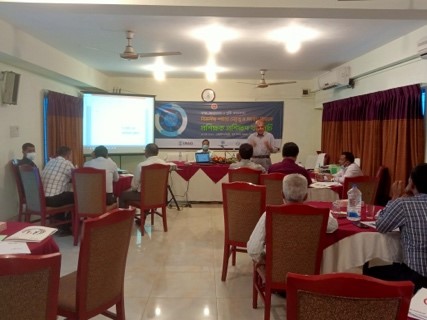 In the curriculum as well as the ToT followed the Reflection, Discussion and Synthesis (RDS) as the overall methods while particular methodology followed throughout the formal sessions includes:
In the curriculum as well as the ToT followed the Reflection, Discussion and Synthesis (RDS) as the overall methods while particular methodology followed throughout the formal sessions includes:
- Open and plenary discussions
- Question-answer
- Multi-media presentation
- Card writing
- Group work.
Observation
A wider level of proactive participation was circumambient throughout the ToT program that made this course participatory which helped the participants in considering this course to bring for further level of ToT for district and Upazila level officials. During the course, participants share their own experiences and exchange views, get involved with interactive discussions, enjoy presentations supported by session exercises and reflections.
OSMA application software has been formally handed over to the ministry and its unit officials
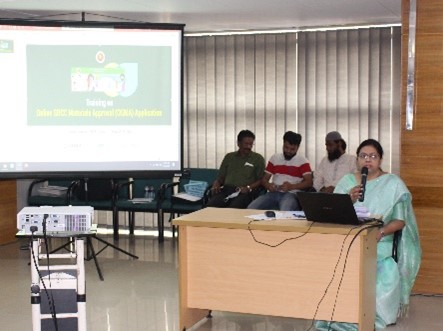 After being test run followed by the practical use by the ministry and its units for three years, the Online SBCC Material Approval (OSMA) software has been formally handed over to the ministry and its units officials. This handing over was made combined with a two-day training of the ministry and unit officials held on May 28-29, 2022. The USAID-Ujjiban SBCC Project provided the technical assistance to the concept and software development followed by the test run and practical use phase which has now been consummated with this handing over process.
After being test run followed by the practical use by the ministry and its units for three years, the Online SBCC Material Approval (OSMA) software has been formally handed over to the ministry and its units officials. This handing over was made combined with a two-day training of the ministry and unit officials held on May 28-29, 2022. The USAID-Ujjiban SBCC Project provided the technical assistance to the concept and software development followed by the test run and practical use phase which has now been consummated with this handing over process.
The opening ceremony of this two-day handing over event along with the training was inaugurated by Dr. Ashrafi Ahmad, Additional Secretary (ME&FWD), MoHFW attending the event as Chief Guest. This opening ceremony were also attended by Mr. Ahsanul Aziz, Deputy Secretary (Pop.-1), MoHFW and Dr. Shibbir Ahmed Osmani, Deputy Secretary (PH-1), MoHFW as Special Guest.
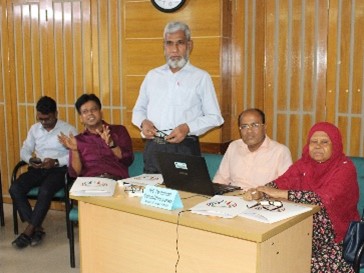 In her opening remarks the Additional Secretary (ME&FWD), MoHFW emphasized on the importance of the OSMA software which will be contributing to ensure at least four aspects of the SBCC material development as; 1) instant and quicker submission and approval of the material through online 2) maintain quality of the materials 3) avoid duplication and 4) instant archiving of the approved materials as a national repository. She thanked Ujjiban for their continuous SBCC support to the ministry and the units and made a request to continue it.
In her opening remarks the Additional Secretary (ME&FWD), MoHFW emphasized on the importance of the OSMA software which will be contributing to ensure at least four aspects of the SBCC material development as; 1) instant and quicker submission and approval of the material through online 2) maintain quality of the materials 3) avoid duplication and 4) instant archiving of the approved materials as a national repository. She thanked Ujjiban for their continuous SBCC support to the ministry and the units and made a request to continue it.
Attended by 18 officials represents the MoHFW, IEM unit of DGFP and BHE of the DGHS; this handing over and training event went very interactive going through the combined methodology of the plenary session, open discussion, question-answer, group work and group presentation. In order to make this apps further added with few features for bringing up effectiveness and user-friendliness of the software, the participants made the following recommendations: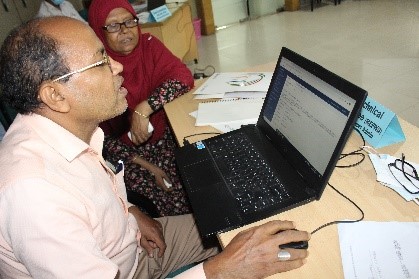 - Automated attachment of the attendee list with the minutes will bring a completeness of this document
- Automated attachment of the attendee list with the minutes will bring a completeness of this document
- Integrate this apps with the GoBs eFiling system to get it further synchronized with as part of GoB’s regular office system
- Make regular updates in the change of names with the change of the members of the IEC Technical Committee
- Automated system to build on into the software for posting of the minutes to went on to the emails of the IEC Technical Committee members.
Ujjiban had their responses over these recommendations that all these additions are possible and will be pursued with the ministry for their endorsement and approval.
Field level introduction of School Health, Population and Nutrition Education (SHPNE) Package goes for its second-round training
A field level introduction to the SHPNE Package continued as the 2nd batch of training for the Sub-Assistant Community Medical Officer (SACMO) have been held at the Cox’s Bazar district on June 19, 2022. USAID-Ujjiban SBCC project is providing technical assistance in planning and implementation of this training for the IEM unit of DGFP.
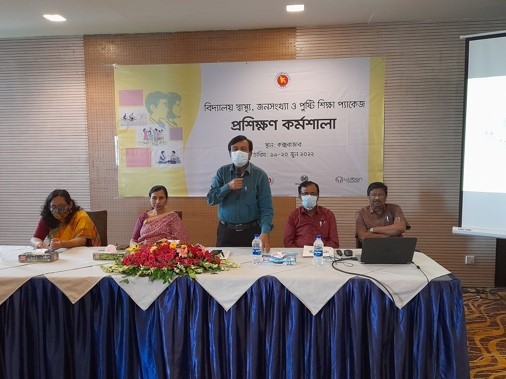 This 2-day training program was formally inaugurated by the DD, IEM in a brief inaugural session with the presence of the DDFP, Cox’s Bazar as chairperson. They urged upon the attendees to bring this SHPNE package in to the schools with all their sincere and diligent effort. A total of 26 participants attended this training course of whom 22 were SACMOs from different Union Parishad based FWC and of 4 NGOs represents ACLAB, IPSA, BRAC and Save the Children.
This 2-day training program was formally inaugurated by the DD, IEM in a brief inaugural session with the presence of the DDFP, Cox’s Bazar as chairperson. They urged upon the attendees to bring this SHPNE package in to the schools with all their sincere and diligent effort. A total of 26 participants attended this training course of whom 22 were SACMOs from different Union Parishad based FWC and of 4 NGOs represents ACLAB, IPSA, BRAC and Save the Children.
This training program found the participants to be very interactive and inquisitive to get issues cleared. Their proactive participation makes the training sessions as very much interactive and participatory. Both SACMO and local NGOs shared their field level experiences about how they organize school level health education and conduct and facilitate orientation sessions.
 It is envisaged that this training will profusely contribute to enhancing knowledge and skills about the topics and issues of SHPNE package. The trainee participants will now be better equipped to conduct and facilitate better school level orientation on the SHPNE package.
It is envisaged that this training will profusely contribute to enhancing knowledge and skills about the topics and issues of SHPNE package. The trainee participants will now be better equipped to conduct and facilitate better school level orientation on the SHPNE package.
“Mitigate the climate change is the dire need for the Bangladesh”
- Dr. Tahmina Shirin, Director, IEDCR
With the aim of building the capacity of central and field level health professionals of DGHS on the effects of climate change on health, BCCP has been awarded a project by the World Health Organization (WHO) for conducting "Training Need Assessment, Manual Development and Conduction of TOT for Health Sector Personnel on Climate Change and Health". BCCP completed TNA successfully following Key Informants Interview (KII), Focus Group Discussion (FGD) and literature review. Based on the findings of that TNA draft contents of the training modules were prepared for central level and field level health professionals.
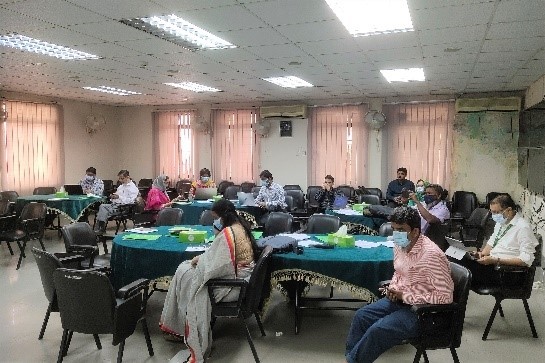 To finalize the draft content of the modules, a workshop was held on 21 April 2022 in the auditorium of Institution of Epidemiology Disease Control and Research (IEDCR) at Mohakhali. Prof. Dr. Tahmina Shirin, Director, IEDCR inaugurated the workshop. In her inaugural speech she emphasized the necessity of working on climate change issue and told that “Mitigate the climate change is the dire need for the Bangladesh”.
A total of 18 professionals were present in the workshop having representation from the World Health Organization (WHO), Directorate General of Health Services (DGHS), Institute of Epidemiology Disease Control and Research (IEDCR) and Centre for Medical Education (CME).
To finalize the draft content of the modules, a workshop was held on 21 April 2022 in the auditorium of Institution of Epidemiology Disease Control and Research (IEDCR) at Mohakhali. Prof. Dr. Tahmina Shirin, Director, IEDCR inaugurated the workshop. In her inaugural speech she emphasized the necessity of working on climate change issue and told that “Mitigate the climate change is the dire need for the Bangladesh”.
A total of 18 professionals were present in the workshop having representation from the World Health Organization (WHO), Directorate General of Health Services (DGHS), Institute of Epidemiology Disease Control and Research (IEDCR) and Centre for Medical Education (CME).
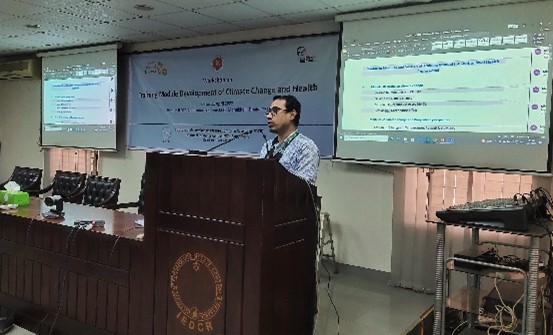 The workshop started with a presentation on findings from the training need assessment conducted by BCCP. Followings presentation a question answer session was held. After that, participants were divided into four groups to work on finalizing the draft content of the training module. Two group worked on draft content of central level health professionals and the other two group worked on content of the central level health professionals. Professionals from BCCP also assisted the groups during this session. After the group work, one presenter from each group presented their key findings and proposed required modifications of the draft content of the training modules. Finally, the workshop concluded with a vote of thanks.
The workshop started with a presentation on findings from the training need assessment conducted by BCCP. Followings presentation a question answer session was held. After that, participants were divided into four groups to work on finalizing the draft content of the training module. Two group worked on draft content of central level health professionals and the other two group worked on content of the central level health professionals. Professionals from BCCP also assisted the groups during this session. After the group work, one presenter from each group presented their key findings and proposed required modifications of the draft content of the training modules. Finally, the workshop concluded with a vote of thanks.
At present BCCP has been working on modifying the finalized version of the draft content to develop a complete training module for health professionals.
Earth and Environmental Science Faculty’s Career Festival and Research Fair 2022 held amid growing need of responses on the climate change issues
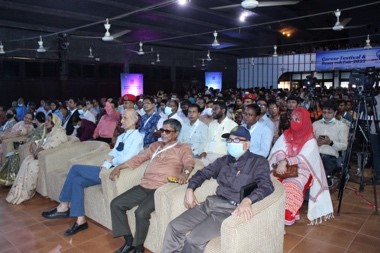 Considering the relevance and role of research and education in various departments under the faculty of Earth and Environmental Science of the Dhaka University and introduce career planners with relevant GoB, NGO and private sector organizations, a day-long Career Festival and Research fair 2022 have been held yesterday the May 17, 2022 in the TSC complex field of the Dhaka University.
Considering the relevance and role of research and education in various departments under the faculty of Earth and Environmental Science of the Dhaka University and introduce career planners with relevant GoB, NGO and private sector organizations, a day-long Career Festival and Research fair 2022 have been held yesterday the May 17, 2022 in the TSC complex field of the Dhaka University.
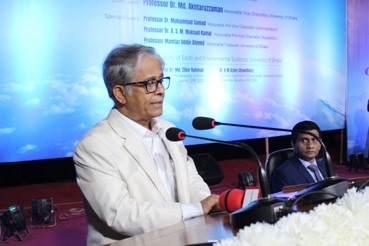 As many as 41 GoB, NGO and private sector organizations participated in this Career Festival and Research fair 2022. With the invitation from the Earth and Environmental Science Faculty BCCP also took part in this fair and set up a stall to highlight the need of strategic communication in the social developmental programs including environment, climate change and disaster management in building an informed, enlightened and empowered society.
As many as 41 GoB, NGO and private sector organizations participated in this Career Festival and Research fair 2022. With the invitation from the Earth and Environmental Science Faculty BCCP also took part in this fair and set up a stall to highlight the need of strategic communication in the social developmental programs including environment, climate change and disaster management in building an informed, enlightened and empowered society.
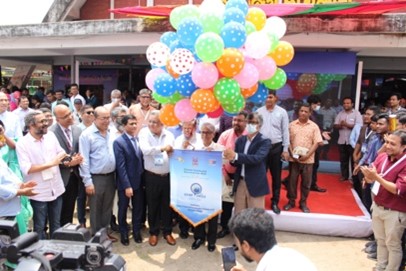 Bangladesh is the most populated delta in the world while it is blessed with fertile land and large number of freshwater rivers that have helped the blooming of agriculture and achieving of self-sufficiency in food. However, as deltas have their own issues being one of the most fragile ecosystems on earth, natural disasters are common in Bangladesh. Therefore, research and education are essential in the context of SDG by 2030, vision 2041 and delta plan 2100 and this information played as backdrop force for organizing this fair.
Bangladesh is the most populated delta in the world while it is blessed with fertile land and large number of freshwater rivers that have helped the blooming of agriculture and achieving of self-sufficiency in food. However, as deltas have their own issues being one of the most fragile ecosystems on earth, natural disasters are common in Bangladesh. Therefore, research and education are essential in the context of SDG by 2030, vision 2041 and delta plan 2100 and this information played as backdrop force for organizing this fair.
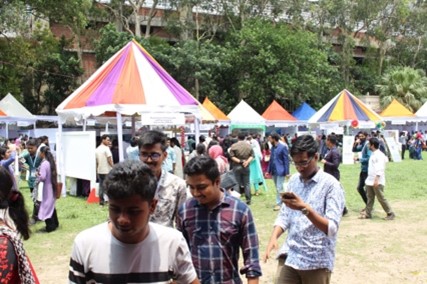 The fair event was commenced with a inaugural ceremony attended by the DU Vice-Chancellor Prof. Dr. Md. Akhtaruzzaman, as Chief Guest while Prof. Dr. Mohammad Samad, Pro-VC (Admn.), Prof. Dr. A S M Maksud Kamal, Pro-VC (Academic) and Prof. Mamatazuddin Ahmed, Treasurer attended as special Guest. Prof. Dr. Md. Zillur Rahman, Dean faculty of Earth and Environmental Science and Dr. K M Azam Chowdhury, Chairman Department of oceanology were also taken part in the inauguration ceremony and spoke on the occasion.
The fair event was commenced with a inaugural ceremony attended by the DU Vice-Chancellor Prof. Dr. Md. Akhtaruzzaman, as Chief Guest while Prof. Dr. Mohammad Samad, Pro-VC (Admn.), Prof. Dr. A S M Maksud Kamal, Pro-VC (Academic) and Prof. Mamatazuddin Ahmed, Treasurer attended as special Guest. Prof. Dr. Md. Zillur Rahman, Dean faculty of Earth and Environmental Science and Dr. K M Azam Chowdhury, Chairman Department of oceanology were also taken part in the inauguration ceremony and spoke on the occasion.
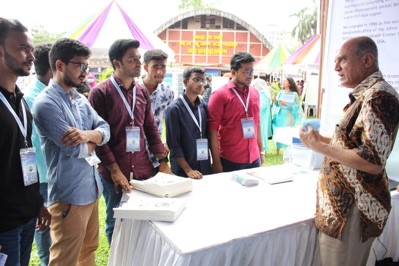 A large number of career and research opportunity searcher who are mostly students of Dhaka University gathered in the event and visited the stalls. BCCP stalls were also visited by a large number of visitors whom were briefed about its activities and future opportunities for carrier and research. BCCP’s participation in this fair have been appreciated by the faculty of Earth and Environmental Science by providing an appreciation crest.
A large number of career and research opportunity searcher who are mostly students of Dhaka University gathered in the event and visited the stalls. BCCP stalls were also visited by a large number of visitors whom were briefed about its activities and future opportunities for carrier and research. BCCP’s participation in this fair have been appreciated by the faculty of Earth and Environmental Science by providing an appreciation crest.
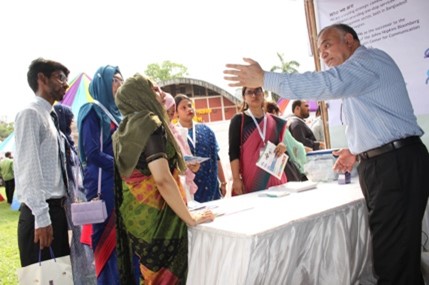
Let’s Nurture Our Love for Children by Nurturing Their Good Hygiene Practices: an initiative undertaken in the Rohingya camps
Nurturing good hygiene practices in childcare is necessary for a child’s development. Learning self-hygiene tasks helps to stop the spread of disease and encourages children to develop lifelong positive hygiene habits. One of the most important good hygiene habits that children need to learn is hand washing, which reduces the risk of them getting ill. But there are other self-help and self-care skills too, like regularly showering or brushing teeth, that can also limit cross-infection.
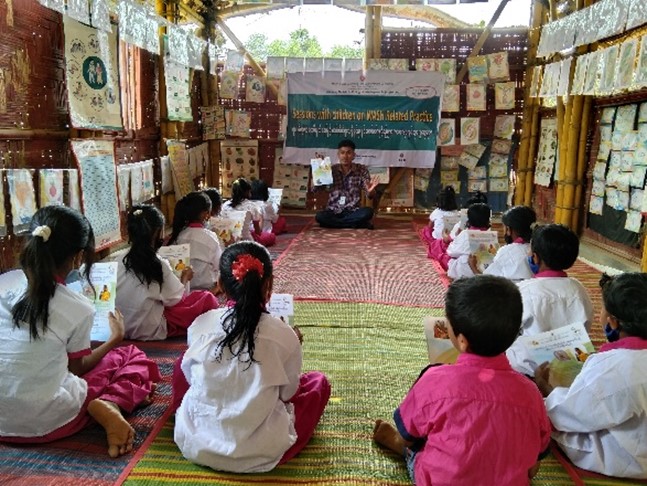 It is said that prevention is better than cure. And when it comes to health, the ideal way to keep health at its best condition is to maintain the general norms of sanitation and hygiene. This is indeed the best way to stay protected from the infections. But while we, adults, understand the importance of hygiene, teaching kids about the same can be quite a challenge. Kids go out and play, they mix with plenty of people, and they do not keep the standard of hygiene all the time in their minds. In case of the children of Rohingya people living in Camps at Ukhiya and Teknaf under Cox’s Bazar this situation is much challenging. Also, children often have a weaker immune system than elders. Hence, it is of paramount importance that children are to be kept aware of the hazards that might arise out of negligence related to regular health and hygiene practices.
It is said that prevention is better than cure. And when it comes to health, the ideal way to keep health at its best condition is to maintain the general norms of sanitation and hygiene. This is indeed the best way to stay protected from the infections. But while we, adults, understand the importance of hygiene, teaching kids about the same can be quite a challenge. Kids go out and play, they mix with plenty of people, and they do not keep the standard of hygiene all the time in their minds. In case of the children of Rohingya people living in Camps at Ukhiya and Teknaf under Cox’s Bazar this situation is much challenging. Also, children often have a weaker immune system than elders. Hence, it is of paramount importance that children are to be kept aware of the hazards that might arise out of negligence related to regular health and hygiene practices.
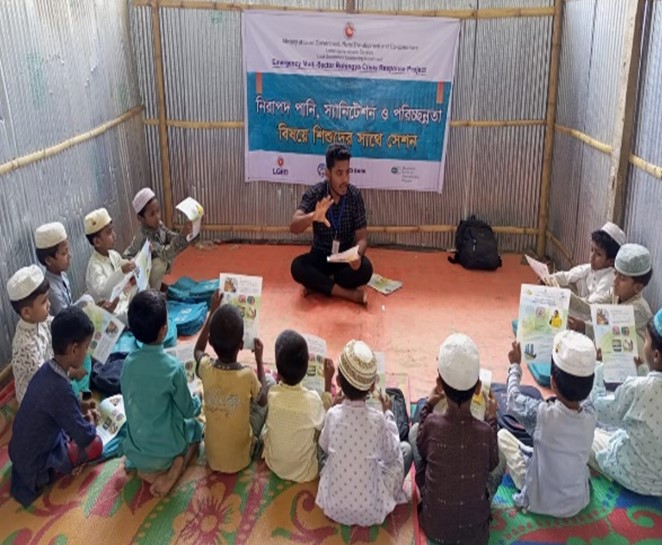 Considering this situation BCCP’s EMCRP team conducting learning sessions with the Children of Displaced Rohingya People (DRP). A total of seventy (70) sessions were conducted at 70 learning centers at the Rohingya Camps with around 1050 DRP children. The learning centers were selected in consultation with the Camp In charge (CIC, Executive Magistrate).
Considering this situation BCCP’s EMCRP team conducting learning sessions with the Children of Displaced Rohingya People (DRP). A total of seventy (70) sessions were conducted at 70 learning centers at the Rohingya Camps with around 1050 DRP children. The learning centers were selected in consultation with the Camp In charge (CIC, Executive Magistrate).
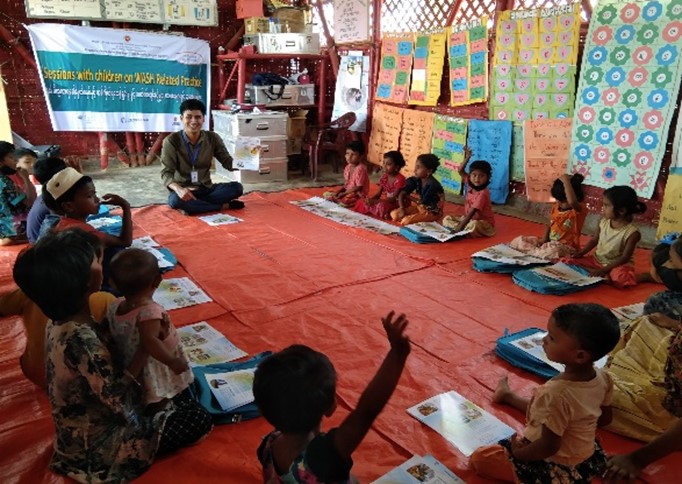 Objectives of the session was to improve knowledge and practice of the children on WASH practice including appropriate use of sanitation, safe water, personal hygiene. The children were also sensitized to share their knowledge and learning to their families and friends. The sessions were designed in an interactive manner having questions answers, brain storming, involving the children in story telling etc. In most of the sessions, the local NGO volunteers or representatives from CIC office was present and delivered their interactive speech with the children.
Objectives of the session was to improve knowledge and practice of the children on WASH practice including appropriate use of sanitation, safe water, personal hygiene. The children were also sensitized to share their knowledge and learning to their families and friends. The sessions were designed in an interactive manner having questions answers, brain storming, involving the children in story telling etc. In most of the sessions, the local NGO volunteers or representatives from CIC office was present and delivered their interactive speech with the children.
Appropriate message development will connect people with serious mental disorders living in poor urban areas accessing to quality mental health care
- - Dr. Tanjir Rashid Soron, Principal Investigator, TRANSFORM Bangladesh Site
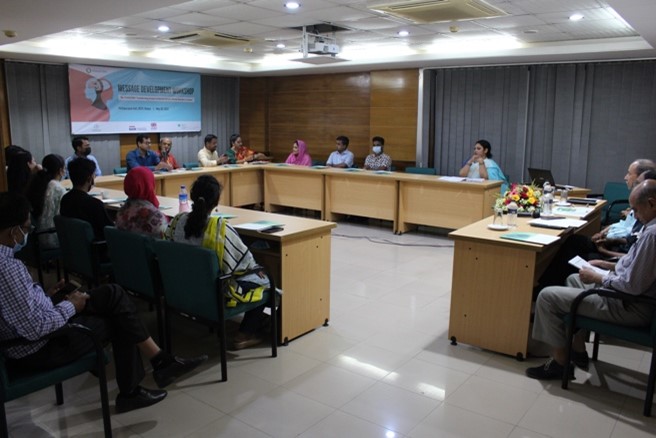 A day-long workshop on message development emphasized on the importance of communicating with the community and engaging them to support for helping people with serious mental disorders living in poor urban areas accessing to quality mental health care. This workshop was held under the Transforming Access to Care for Serious Mental Disorders in Slums (TRANSFORM) project. The TRANSFORM project is a partnership between the University of Warwick, UK, The University of Ibadan, Nigeria, and the Telepsychiatry Research and Innovation Network (TRIN), Bangladesh. As a partner of TRIN Ltd., Bangladesh Center for Communication Programs (BCCP) is working in this project to support the TRANSFORM Project through Community Engagement Activities and Development of Communication Materials.
A day-long workshop on message development emphasized on the importance of communicating with the community and engaging them to support for helping people with serious mental disorders living in poor urban areas accessing to quality mental health care. This workshop was held under the Transforming Access to Care for Serious Mental Disorders in Slums (TRANSFORM) project. The TRANSFORM project is a partnership between the University of Warwick, UK, The University of Ibadan, Nigeria, and the Telepsychiatry Research and Innovation Network (TRIN), Bangladesh. As a partner of TRIN Ltd., Bangladesh Center for Communication Programs (BCCP) is working in this project to support the TRANSFORM Project through Community Engagement Activities and Development of Communication Materials.
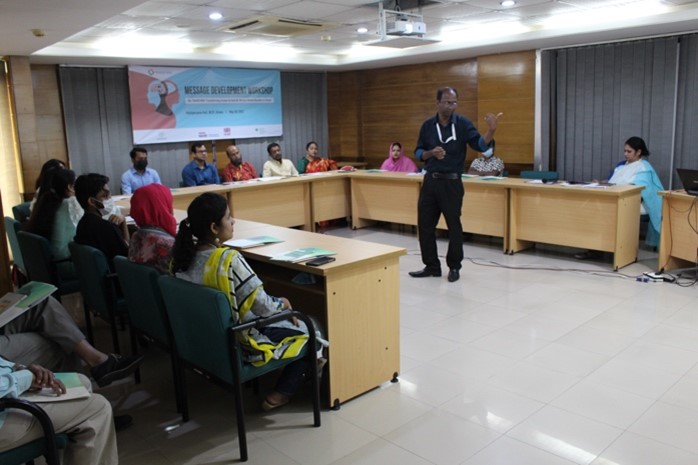 As the TRIN Bangladesh has an understanding about how the mental disorder is perceived and treated, that will lead them to work with traditional healers, health workers and professionals to develop training program. While working with traditional healers and community health workers, community engagement will be required to make them aware about their support for accessing to the local mental health services. Appropriate message will be the key to plan for and conduction of the community engagement and community awareness effort aiming which the message development workshop was planned and organized.
As the TRIN Bangladesh has an understanding about how the mental disorder is perceived and treated, that will lead them to work with traditional healers, health workers and professionals to develop training program. While working with traditional healers and community health workers, community engagement will be required to make them aware about their support for accessing to the local mental health services. Appropriate message will be the key to plan for and conduction of the community engagement and community awareness effort aiming which the message development workshop was planned and organized.
The workshop was participated by 14 participants includes 4 CHW, 2 youth leader, 2 community leader, 3 script writer and 1 designer along with 2 mental health experts. A brief opening ceremony was attended by Dr. Tanjir Rashid Soron, Principal Investigator, TRANSFORM Bangladesh Site, Mr. Motaherul Haque, Adviser (Corporate), BCCP and Mr. Shafiqur Rahman, Adviser (Dev.), BCCP. In his opening remarks Dr. Tanjir Rashid Soron mentioned that “only about 8% of the patients bearing with mental disorders are receiving health care and treatment services. In this context appropriate message development will connect people with serious mental disorders living in poor urban areas accessing to quality mental health care.”
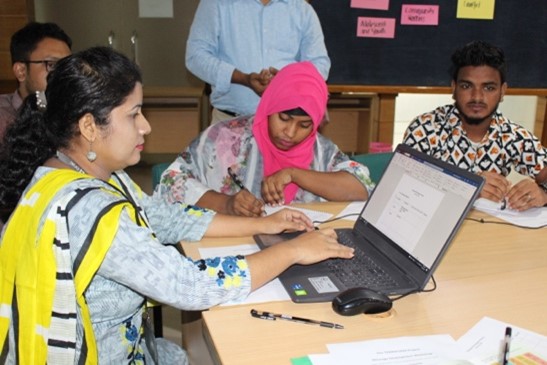 A combination of Reflection, Discussion and Synthesis (RDS) methodology was applied in the workshop that led the participants to follow through the presentation, discussion, question-answer, group work and group presentations. The group work found key message themes for 3 basic SBCC materials for the following target audience groups:
A combination of Reflection, Discussion and Synthesis (RDS) methodology was applied in the workshop that led the participants to follow through the presentation, discussion, question-answer, group work and group presentations. The group work found key message themes for 3 basic SBCC materials for the following target audience groups:

The groups were also facilitated to have conceptualized the draft messages which will be tuned up by the message development experts to bring in certain types of materials.
BCCP STAR OF THE MONTH

As a strategic communication organization, BCCP evaluates each staff in 360 degree each year. But to promote individual staff’s good work as example and encourage him/her to continue the good work, BCCP initiated recognizing the best performer of the month from July 2020 as “BCCP Star of the Month”. Below is the three BCCP Star of the Month recognized during the April to June 2022 period.
Mr. Ankur Chandra Kuri, Service Marketing Officer, BTRF a sister concern of BCCP (April 2022)
 Mr. Ankur Chandra Kuri is currently working as Service Marketing Officer in Bangladesh Training and Research Foundation (BTRF), a sister concern of BCCP. He is an experienced marketing professional with a demonstrated history of working in Tourism and Hospitality, Consumer Goods & Telecommunications industries. He has worked in various marketing roles ranging from service marketing, brand development, advertising and promotion, B2B and B2C sales, pricing, networking, digital marketing, consumer relationship management (CRM), and marketing research. Mr. Ankur has completed Master of Business Administration (MBA) degree in Tourism and Hospitality Management from the Faculty of Business Studies (FBS), University of Dhaka. He has established his image as honest, sincere, and dedicated person to his work.
Mr. Ankur Chandra Kuri is currently working as Service Marketing Officer in Bangladesh Training and Research Foundation (BTRF), a sister concern of BCCP. He is an experienced marketing professional with a demonstrated history of working in Tourism and Hospitality, Consumer Goods & Telecommunications industries. He has worked in various marketing roles ranging from service marketing, brand development, advertising and promotion, B2B and B2C sales, pricing, networking, digital marketing, consumer relationship management (CRM), and marketing research. Mr. Ankur has completed Master of Business Administration (MBA) degree in Tourism and Hospitality Management from the Faculty of Business Studies (FBS), University of Dhaka. He has established his image as honest, sincere, and dedicated person to his work.
Mr. Jafor Ahmed, Business Development Specialist, BCCP (May 2022)
 Mr. Jafor Ahmed is currently working as a Business Development Specialist at BCCP. He has four years of experience in Business Development in commercial sector. Previously he worked at Irving Group as a Business Development Executive, and before that at Kazi IT Center Ltd. as Business Development Analyst. Mr. Jafor completed his graduation and post-graduation from the University of Dhaka. He aspires to transfer and excel his Business Development skills gathered from commercial sector to social development sector. He has established his image as sincere, dedicated and always ready to meet the deadline person to his work.
Mr. Jafor Ahmed is currently working as a Business Development Specialist at BCCP. He has four years of experience in Business Development in commercial sector. Previously he worked at Irving Group as a Business Development Executive, and before that at Kazi IT Center Ltd. as Business Development Analyst. Mr. Jafor completed his graduation and post-graduation from the University of Dhaka. He aspires to transfer and excel his Business Development skills gathered from commercial sector to social development sector. He has established his image as sincere, dedicated and always ready to meet the deadline person to his work.
Mr. Shawmen Paul, Graphic Design Coordinator, ICL a sister concern of BCCP (June 2022)
 Mr. Shawmen Paul has twenty years experience in the graphic designing area. He is skilled in conceptualizing creative materials design, new idea-sharing and has an excellent background in event venue decoration. He has established his image as a creator of visual compositions to solve problems and communicate ideas through typography, imagery, color, and form. His amiable and receptive nature of attitude makes his image as a very cordial and pleasant person always acceptable to his fellow and senior colleagues of the office.
Mr. Shawmen Paul has twenty years experience in the graphic designing area. He is skilled in conceptualizing creative materials design, new idea-sharing and has an excellent background in event venue decoration. He has established his image as a creator of visual compositions to solve problems and communicate ideas through typography, imagery, color, and form. His amiable and receptive nature of attitude makes his image as a very cordial and pleasant person always acceptable to his fellow and senior colleagues of the office.
Editorial
Climate science is filled with uncertainties, a notorious stumbling block for communicating with non-scientists. For some, the topic can seem abstract and intangible. For others, the abstract statistics that define the climate discourse can feel distant from their day-to-day experiences. In some nations, the issue is politically polarized; in others, the absence of a public and political discourse is the problem.
Climate change is a global challenge; however, its impacts are visible in respective countries at local level and effects our everyday lives. It is very much needed to make climate change real and impossible to ignore by focusing on how climate change impacts will affect the people, places and environment in your local community. Empower people to take action by highlighting the many things — big and small — people can do to improve their environment and mitigate causes and effects of climate change at a local level. People naturally feel more engaged when they are empowered to make a difference. Informing the community and engaging with them helps to capture and compile their relevant knowledge to address climate challenges. Once compiled, this often-scattered information may often provide the basis for a government’s strategy for climate-compatible development.
The World Health Organization implements a broad range of advocacy and partnership activities on climate change and health in order to advocate and raise awareness; strengthen international partnerships and governance; enhance scientific evidence; and support health systems to respond to and prepare for a rapidly changing climate. WHO raises awareness on climate risks to health through advocacy campaigns, publications and policy briefs, and the representation of WHO and health actors in climate fora. Through partnerships, networks and collaborations WHO helps to drive the global action needed to protect health from climate risks, and realize the health benefits of low-carbon energy choices. WHO works with leading experts and institutions worldwide to improve the understanding and evidence base of the linkages of health and climate, the burden of disease attributable to climate change, and the economic and health gains from ambitious climate change adaptation and mitigation actions.
According to the Bangladesh Climate Change Strategy and Action Plan developed by the Ministry of Environment and Forests Government of the People's Republic of Bangladesh, there are six pillars to implement the strategy: (1) Food security, social protection and health; (2) Comprehensive disaster management; (3) Infrastructure development; (4) Research and knowledge management; (5) Mitigation and low-carbon development; and (6) Capacity building and institutional development. The Action Plan will be an integral part of national development policies, plans and programs.
With the aim of building the capacity of central and field level health professionals of DGHS on climate change on health, BCCP has been awarded a project by the World Health Organization (WHO) for conducting "Training Need Assessment, Manual Development and Conduction of TOT for Health Sector Personnel on Climate Change and Health". Under this project BCCP entrusted to do TNA with central and field level health professional following Key Informants Interview (KII), Focus Group Discussion (FGD) and literature review. Development of two training modules for central and field level health professionals and conduction of TOT for Health Sector Personnel on Climate Change and Health.
But to successfully gather and build on knowledge related to Climate Change, it is vital to engage the community in dialogue through events, workshops and information campaigns.
In recent time Information and communication technologies (ICTs) have great potential to involve citizens in pinpointing climate change-related problems and solutions, from data-gathering projects and citizen reporting to digital democracy initiatives, where governments invite public consultation on development plans via digital channels. However, when embarking on a major data-gathering or consultative campaign, it pays to consider who has access to ICTs and which voices may be privileged through such a process.
Lancet Article
Scoop News: International Publications
Videos
BCCP PROMOTIONAL VIDEO































